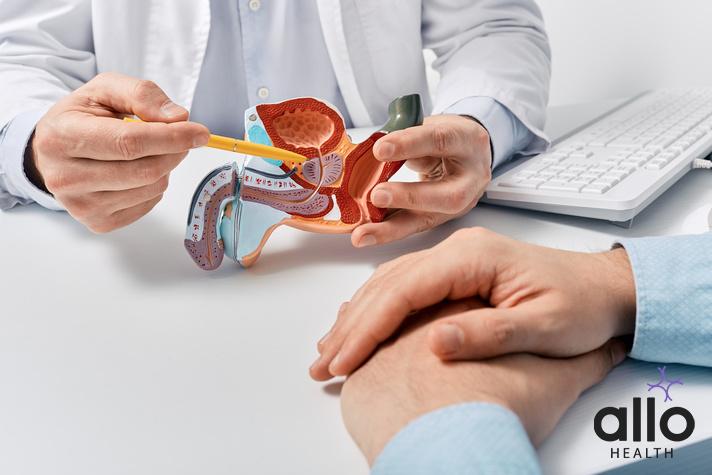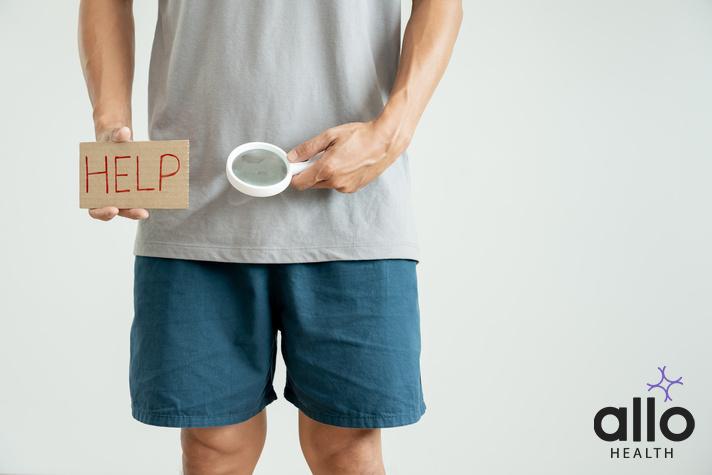Penis Erection Angle: Factors and Health Implications

Allo Health is dedicated to personalized well-being, offering support and trusted information tailored to individual health goals. The platform emphasizes human-generated content, led by a distinguished medical team of experts, including physicians and sexual health specialists. Their commitment to credibility involves rigorous fact-checking, authoritative research, and continuous updates to ensure accurate, up-to-date information. Allo Health's unique approach goes beyond conventional platforms, providing expert-led insights and a continuous commitment to excellence, with user feedback playing a crucial role in shaping the platform's authoritative voice.

Dr.Sushma.V completed MBBS degree from BGS GIMS,bangalore
Why This Was Upated?
Our experts continually monitor the health and wellness space, and we update our articles when new information became available.
Updated on 26 January, 2024
- Article was updated as part of our commitment to diversity, equity, and inclusion.

"The following blog article provides general information and insights on various topics. However, it is important to note that the information presented is not intended as professional advice in any specific field or area. The content of this blog is for general educational and informational purposes only.
Book consultation
The content should not be interpreted as endorsement, recommendation, or guarantee of any product, service, or information mentioned. Readers are solely responsible for the decisions and actions they take based on the information provided in this blog. It is essential to exercise individual judgment, critical thinking, and personal responsibility when applying or implementing any information or suggestions discussed in the blog."
Erectile health is a vital aspect of a man’s overall well-being. The angle of penis erection, often a subject of curiosity and sometimes concern, can vary greatly among individuals. This article explores the various facets of the penis erection angle, including its relation to sexual health, emotional well-being, and underlying health conditions.
What is Penis Erection Angle?
- The penis erection angle refers to the direction or position of the penis when it is erect. This angle can vary greatly among individuals.
- Typically, an erect penis may point upwards, straight out, or downwards, and it may also have a slight curve to the left or right.
- The angle is influenced by factors like the natural anatomy of the penis, the balance of muscles and tissues within it, and the overall health of the individual.
- The erection angle is a personal characteristic and can vary widely among individuals. It’s typically not a concern unless it causes discomfort, pain or interferes with sexual activity, in which case medical advice might be sought.
Factors Influencing Penis Erection Angle
The angle of a penis erection is influenced by a variety of factors, including both physical and psychological aspects. Understanding these factors can help in identifying any underlying health concerns or in simply acknowledging the range of normal variation. Here are some key factors influencing the erection angle:
- Inadequate Blood Flow and Cardiovascular Health: Adequate blood flow is essential for an effective erection. Cardiovascular health plays a critical role in this, as penile blood vessels need to be healthy to allow proper blood flow to the erect penis. Conditions affecting blood pressure can also influence the erection angle.
- Erectile Health and Medical Conditions: Various health conditions, including erectile dysfunction and congenital penile curvature, can impact the erection angle. Erectile health is a complex interplay of physical and psychological factors.
- Emotional and Mental Health Concerns: Psychological factors like stress, anxiety, and overall emotional health significantly affect sexual arousal and consequently, the erection angle. Mental health concerns can lead to variations in the erection of the penis, including its angle.
- Physical Attributes and Anatomy: The anatomy of the penis, including aspects like the presence of scar tissue or being circumcised, can influence its erection angle. The muscles of the penis and the spongey tissue also play a role in determining the angle of erection.
- Congenital Penile Curvature: Some men are born with a natural curvature of the penis (congenital penile curvature), while others may develop curvature due to medical conditions or injuries. This curvature can affect the angle of erection.
- Lifestyle Factors: Healthy lifestyle habits can impact erectile health. Poor habits, such as smoking or excessive alcohol consumption, can negatively affect blood flow and erection angle.
- Age-Related Changes: As men age, changes in erectile function and the angle of erection are common, often linked to changes in blood flow and tissue elasticity.
- Certain Medication and Treatments: Certain medications or treatments, especially those for blood pressure or cardiovascular conditions, can affect erectile function and the angle of erection.
It’s important to note that variations in the penis erection angle are often normal. However, if there are significant concerns or changes in the erection angle, especially if accompanied by other symptoms like pain or loss of erection, consulting with a qualified health provider is advisable.
Impact of Penis Erection Angle in Sexual Activities
The impact of penis erection angle on sexual activities can be significant, affecting both physical comfort and sexual pleasure. Here’s an exploration of these impacts:
Compatibility with Sex Positions
- Variability in Comfort: Certain sex positions may be more or less comfortable depending on the erection angle. For instance, a penis with a more acute angle might find positions like missionary more comfortable, while a straighter erection might better suit positions like doggy style.
- Ease of Penetration: The angle of erection can influence the ease of penetration. A more acute erection angle might make some angles of penetration challenging.
Sexual Pleasure and Satisfaction
- Stimulation Efficiency: The angle of an erect penis can affect how effectively it stimulates the partner’s erogenous zones. This can vary greatly depending on the individual anatomies and preferences of both partners.
- Personal Preferences: Some people might find certain angles more visually or physically stimulating, contributing to the overall sexual experience.
Potential for Discomfort or Pain
- Risk of Injury: Extreme angles, especially if coupled with vigorous activity, can increase the risk of injury to the penis or discomfort for the partner.
- Adaptation to Curvature: Partners may need to adapt to the curvature or angle to prevent discomfort or pain during sexual intercourse.
Psychological Impact
- Confidence and Performance Anxiety: Concerns about erection angle can lead to performance anxiety or reduced sexual confidence, impacting the overall sexual experience.
- Communication with Partner: Open communication about erection angle and how it affects sexual activity can be vital in ensuring a fulfilling sexual experience for both partners.
While the erection angle can have various impacts on sexual activities, it’s essential to remember that sexual satisfaction is influenced by a combination of physical, emotional, and relational factors. Adapting to and communicating about these aspects can enhance the sexual experience.
Health Implications and Concerns

The health implications and concerns related to penis erection angle can be quite significant, ranging from indicators of physical conditions to impacts on sexual and mental health.
Medical Conditions and Erectile Health
- Erectile Dysfunction: Changes in erection angle might be symptomatic of erectile dysfunction, often linked to cardiovascular health and blood flow concerns.
- Congenital Penile Curvature: Some men are born with this condition, where the curvature of the penis is noticeable but not necessarily harmful.
- Peyronie’s Disease: This involves the development of scar tissue in the penis, leading to abnormal curvature and can be a common penis-related injury.
- Injury or Trauma: An abrupt change in erection angle could indicate an injury to the penis.
Emotional and Mental Health Concerns
- Stress and Anxiety: These can impact the mechanism of erection and potentially alter its angle, leading to concerns about erection angle.
- Mental Health Concerns: Ongoing worries about sexual performance or penis appearance can lead to mental health concerns.
Impact on Sexual Function and Relationships
- Sexual Compatibility: Certain angles might make specific sexual positions uncomfortable or less pleasurable, potentially affecting sexual satisfaction in relationships.
Indicators of Underlying Conditions
- Indication of Systemic Diseases: In some cases, changes in erection angle can be early indicators of systemic diseases like diabetes or hypertension.
- Cardiovascular Health: The erection angle can reflect the health of blood vessels. Poor cardiovascular health can lead to impaired blood flow, affecting the strength and angle of erections.
- Loss Of Erection: Difficulty in maintaining an erection or a sudden change in the erection angle may indicate underlying health concerns.
While variations in penis erection angle are often normal, significant changes, especially if accompanied by pain or functional concerns, should be evaluated by a healthcare professional to rule out underlying health concerns.
Seeking Professional Advice

Seeking professional medical advice for concerns related to the penis erection angle is important in the following scenarios:
- Significant Change in Erection Angle: If there’s a noticeable change from the usual erection angle, especially if it occurs suddenly.
- Pain or Discomfort: Experiencing pain during erection or sexual activity, which could indicate an underlying condition.
- Difficulty in Sexual Performance: If the erection angle hinders sexual intercourse or makes certain sex positions uncomfortable or impossible.
- Erection Loss or Erectile Dysfunction: Inability to maintain an adequate erection for sexual activity or a noticeable decrease in erectile firmness.
- Visible Deformities: Any visible changes in the shape of the penis, such as severe curvature or lumps.
- History of Trauma or Injury: If there’s been an injury to the penis, which might have affected its function or structure.
- Accompanying Symptoms: Presence of other symptoms like urinary difficulties, blood in urine or semen or unusual discharge.
- Concerns About Penile Curvature: If the curvature is severe, like in congenital penile curvature or peyronie’s disease, which can worsen over time.
It’s important to consult with a qualified health provider to get a proper diagnosis and appropriate treatment. They can provide guidance based on individual health status and specific concerns.
Conclusion
It’s important to understand that a range of factors, from blood vessels health to emotional state, can influence the erection angle. While a certain degree of curvature is normal, significant concerns should be discussed with health professionals. Maintaining a healthy lifestyle and addressing any underlying health conditions are vital for maintaining sexual and erectile health.
Most Asked Questions
-
Why does the angle of my erection vary?
The angle of your erection can change due to several reasons. It’s often linked to how much blood flows into your penis and the health of your blood vessels. Sometimes, the muscles of your penis and even the shape of your penis can play a role. Also, things like your overall health, stress levels, and even how you’re feeling emotionally can make a difference. It’s pretty normal for the angle to be different at times.
-
Is it okay if my erection isn’t perfectly straight?
Yes, it’s perfectly okay. Most men don’t have a completely straight erection. A slight curve or a different angle is very common and usually nothing to worry about. It’s normal for erections to vary in shape and size, so unless it causes discomfort or pain, there’s generally no need for concern.
-
Can the way I feel emotionally affect my penis erection angle?
Yes, it can. Your emotions and mental state can influence your sexual arousal and, consequently, your erection. Stress, anxiety, or other mental health concerns can impact how your body responds, including the angle and firmness of your erection. Taking care of your emotional health is just as important as looking after your physical health.
-
Should I see a doctor about my penis erection angle?
If you notice a sudden change in your erection angle, especially if it’s painful or affects your sexual activity, it might be a good idea to talk to a health professional. They can check if there’s a medical reason behind it and offer the right advice or treatment. Remember, it’s always better to ask and be sure, especially when it comes to your health.






































